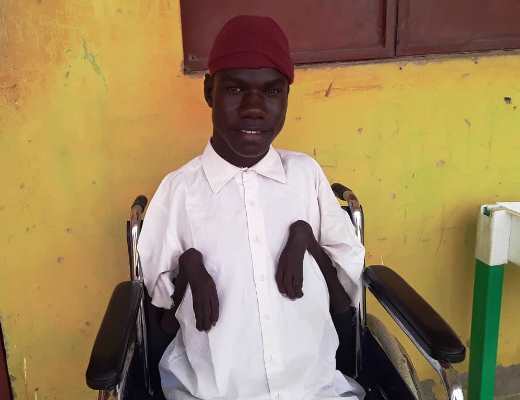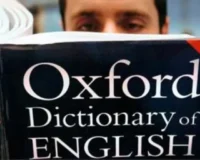The 21-year old Kamal Usman recently become a media sensation across Nigeria after a trending viral video of him appeared on the social media writing with his mouth, and to put up piece and pieces of every story around him, ASHENEWS reports.
ASHENEWS met with Usman Ibrahim, Kamal’s father, who said his family migrated to Kagara town in 2020 following incessant bandit attacks on Uregi village (where they hail) in Rafi local government area of Niger state, where Kamal had earlier completed his primary school education prior to their migration.
A few weeks in Kagara town, Kamal pressured his parents to enroll him for secondary education, and eventually got admitted into the Salihu Tanko Day Secondary School, Kagara. Though he lost an academic year to his family’s sudden displacement, Kamal, undeterred, resumed school with a renewed vigor to excel after his enrollment alongside his brother. Through thin and thick, he completed his Junior Secondary Schools (JSS) last week after writing the 2023 junior West African School Certificate Examination (WAEC), commonly known as Junior WAEC.
Kamal’s school signpost
How it happened
As soon as they settled in Kagara, Kamal’s first request, according to his father, was to return to school. “I told Kamal that he needed to drop the idea of going to school because we were now living off other people. He begged me to allow him to go even if I didn’t believe he could succeed. His insistence got me and I thought I trust in God and allow him to go,” the father said.
Kamal told ASHENEWS that although he could not contain his happiness on the very day he would be enrolled in a secondary school, his happiness was short-lived because of the thought that he could not write. “I became confused when on the first day, I sat in the classroom for my first lesson in school. I looked round the classroom and saw that I was the only abnormal student; every student was using his hands to take notes, except I,” he told ASHENEWS while revealing that, that was “my first challenge being a person with disability.”
According to his father, Kamal was born in that condition where he couldn’t use his legs and hands for anything, “and in that situation, he was enrolled in the primary school at age seven.” And Kamal interjected “But I could only go to school on the back of my friends or siblings.”
Kamal said in the primary school, he became thoughtful of how he could use other parts of his body to write. “The thought of using my mouth crossed my mind, and I beat the challenge by learning to write with it,” thereby daring his disability, and exceptionally learning and becoming good at using his mouth to write.
Kamal has deep enthusiasm for education despite his limitations, the top of which is his physical disability, which has made him to rely on assistance from others, including to eat.
His fascination for education has stolen the hearts of many, and propelled by his unwavering devotion to succeed, Kamal, with the assistance of the management of the Salihu Tanko Day Secondary School, is defying all odds to change his life for the better. “I cannot go on the street to beg like other young people, if only I will get support to read and become useful to myself, parents, and the society,” he asserts.
As the only student with a prominent disability in the school, Kamal’s insight has endeared him to his teachers and classmates.
“When I first saw him, I was a bit skeptical that he might not cope but when we put him to test, and realized that he could do most of the things his mates can do and even better. He is doing so well that we didn’t even need to do certain things differently for him,” Alhassan Shakrudeen, Kamal’s class teacher and the school’s assistant examiner, told ASHENEWS.
“Kamal Usman shows that there is ability in disability. The things he does, most of those with hands and legs can’t do. His school achievement is excellent. He can look at the chalkboard once, read three lines, and write them down,” Alhassan added.
The third of nine children from the family, Kamal has refused to use his disability as an excuse, but has instead chosen to glide on this seeming shortcoming to change his life.
“When I look at my classmates, I never feel inadequate because I know that when it comes to studying, there is hardly anyone who can beat me at it. The only difference is that I can’t run on my two feet,” he says jokingly.
Kamal’s ambition is to be a lawyer in the future, a goal he is certain that with support he can achieve.
According to him, his interest in law is linked to a burning desire to speak for the downtrodden. “I want to help the weak. There are times when people get prosecuted and I am left thinking about what I would have done differently if I was the judge,” he says.
For Kamal, education is not only the way of fulfilling his ambitions but also his way out of poverty and destitution. “I know my father’s condition. He is a helpless old man. The only thing I want is an opportunity to continue my education. I have since realized that this is the only way I can have a better future,” Kamal further told ASHENEWS.
“Why I encouraged Kamal to drop out of school – Father”
But Kamal’s 50-year-old father, Usman Ibrahim was a farmer before armed bandits forced him and other farmers from Uregi. All Ibrahim was struggling for his son, was to be able to walk and have hands. Education, according to him, was not one of his wishes for Kamal.
“When Kamal was born, I had nothing. I came to the local government secretariat for help and they gave me N30,000. What I wanted at that time was for him to be able to use his hands.
“We went to various hospitals in Zaria, Bida, and then Minna in search of solution. I can’t say why but I met doctors who told me to just go home and be patient with him. But now when I think about it, I keep wondering maybe things would have been different if I had money.
“A few other times, I was told that the doctors who could talk to us about his condition were not around. That was how we wasted that money and eventually came back home. We have never gone back to enquire about his condition since then,” Ibrahim told ASHENEWS.
Ibrahim would later decide that Kamal doesn’t think of going further after his primary education. “His friends will come every school day to take him on their backs to school when they were younger. I never thought it would go beyond that.
“As time went on, I realized that he was very wise. I noticed this when I saw that his friends were coming to him with their schoolwork to help them out. This ignited a bit of hope in me until when we had to leave our home due to banditry.”
The school management also played a key role in keeping Kamal’s hope of advancing his studies burning, Kamal’s father says.
“His teachers have been encouraging me by letting me know how well Kamal was doing in school. They have also made their efforts at helping him get support.
“I used to think that his obsession with schooling would pass but it didn’t. I have come to realize that this is his calling,” Ibrahim said.
Ibrahim’s concerns could be linked to the age-long neglect of persons with disabilities by the society. The society has always treated persons with disabilities differently and fused with poverty, the challenge prevails.
“My only fear was that the challenges would be too much for him to bear. I never sat in a classroom myself so I did not know if a person with his condition had a chance,” he said.
A passionate appeal to support Kamal’s academic pursuit
Fortunately for Kamal, unlike the majority of the over 10 million Nigerians living with a disabilities, has no strong support system.
During an interview with Kamal at the school premises, a young boy seated eagerly on the pavement, and as Kamal reached out for his book, the young boy got up hurriedly, to help him open it.
“We call them two in one because they are always together,” the school’s Vice Principal, Jibrin Jibo says about Ibrahim Usman, Kamal’s younger brother.
While a strong support system has helped buffer the impacts of Kamal’s disability, financial challenges endanger his academic quest. Kamal may be forced to discontinue his studies and return home if he fails to get support to further his education.
Already, Kamal’s mother and siblings have moved back to their ancestral home in Uregi, with the return of relative peace to the area, and his father, having had a change of mind regarding Kamal’s education, now seeks public support for his son’s education.
“I want this boy to go to school. I have no means of sending him to school; I know that without hands and legs, he can do very little in our society, but education takes you far. When he decided to go to secondary school, I was among those that told him to let go of that dream but he insisted he would. He said Baba (father), allow me, I will find my way around it.
“He didn’t want to listen to anything I had to say at that time. He said as long as he can write with his mouth, he can go to school and so I allowed him to go. We don’t have the resources to send him to school. He has shown us that he wants to go to school and he can cope in school,” Kamal’s father says.
“For someone with a disability, Kamal can go places if the public is willing to support him,” says Alhassan Shakrudeen, Kamal’s class teacher and the school’s assistant examiner.
On his part, Kamal says “I am passionate about getting an education but my parents are in a difficult situation. Even though I am doing well currently, the constant thought about my parent’s financial situation would affect my studies.”
Asked if he has ever considered backing out, Kamal smiles confidently and gives a resolute ‘No’ as an answer.
“If I can just get someone that will keep me and my brother in school, I know I will succeed,”
The pursuit of inclusive education
In the quest for inclusive education, society must begin to better the chances of people like Kamal to stay in school. Without education, they face considerable chances of neglect in the future.
An absence of access to education not only impedes Kamal’s chances of participating in social, economic, and political life, all of which have lifelong implications but also deters the 2030 agenda for sustainable development.
With education, this teenager, who has proven that he is trainable, stands a chance at a better future devoid of over-dependence on others.
With over 11 million people living with disabilities in Nigeria, according to the 2019 Water, Sanitation, Hygiene National Outcome Routine Mapping Report by the NBS, a lack of action by stakeholders leaves them at risk of dying earlier, battling with poorer health, and experiencing more limitations in everyday functioning than others.
“Poverty, exclusion from education and employment, and poor living conditions all add to the risk of poor health and unmet health care needs among persons with disabilities,” the WHO says.







